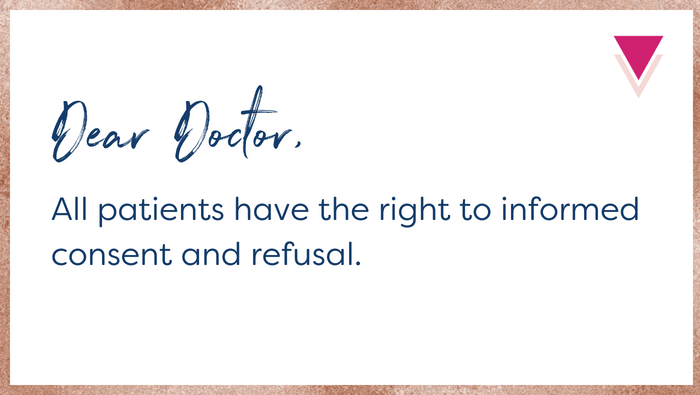The performance of medical procedures without consent on a competent adult is unethical, unprofessional, and possibly illegal. More specifically, when a medical or midwifery professional administers a procedure without the consent of the pregnant or laboring person–including a vaginal exam, stripping of the membranes, breaking of the water, or episiotomy–it is obstetric violence. Procedures involving the genitals may also be perceived as sexually traumatic by the person on the receiving end.

Several months ago, I wrote a letter to send to a Virginia obstetrician after one of her patients contacted me to discuss filing a complaint for a forced cervical check; other women had contacted me with similar complaints before and after that. So, I decided to publish my letter here with permission to the public to use it as inspiration for your own letters. You are welcome to use any of the language below. You may also download a template of this letter directly to your computer here, and it can be altered to be sent from third parties like doulas and partners. You may send your letter(s) directly to the person who administered the procedure or to others, like hospital legal departments, physician insurance companies, and state medical or nursing boards. (For more on filing complaints, go here. For one-on-one assistance writing or maximizing the impact of your letter, contact me for a consultation.)
By sending these letters, we are making steps to bring transparency and accountability to these brutal, widespread practices. You are welcome to comment below if you’ve ever had this experience–often, the first step in healing is simply speaking the trauma out loud, when you are ready to do so.
[Date]
Dear Dr. _____,
I am a consumer advocate who holds executive and advisory positions at national and international organizations working to advance maternity care. I have great respect and compassion for your training and profession. I understand that there are many pressures and many barriers to providing the most respectful and compassionate care. I know obstetricians are overworked and overtired and have crushing liability concerns, as well as various administrative pressures.
With that understanding, I need to tell you that I was recently contacted by —–, a patient of yours who gave birth in —–. Ms. —– conveyed to me that immediately prior to the birth of her baby, she declined a cervical check from you, but you proceeded with the cervical check in spite of her explicit refusal and as she attempted to physically move away from you on the bed while crying, screaming, and begging for you to stop.
Ms. —– has expressed that she was traumatized that this procedure was administered and continued without her consent. I understand that she gave fully informed consent for the other procedures administered during her labor and she has no complaints about the rest of her care; she made it clear to me that the non-consented cervical exam is the source of her trauma.
I was not there and I’m sure there are many more details to this story that only you and Ms. —– know. I understand that you cannot discuss any of those details with a third party. However, I did want to let you know some facts about the scenario as Ms. —– described it:
– Battery: It may be considered battery to perform a vaginal exam or other procedure on a patient against her will. Medical professionals do not have the right to touch, penetrate, or treat patients against their will, even in the course of childbirth. In California, a doctor recently surrendered his medical license after a patient sued him for assault & battery following a forced episiotomy (see “Woman Forced into Episiotomy Fights Back with Lawsuit,” by Beth Greenfield, published June 4, 2015 on Yahoo.com).
– Informed Consent & Refusal: All patients have the right to informed consent and refusal. These are both constitutionally based rights of patients and fundamental ethical tenets for physicians. The American College of Obstetricians and Gynecologists (ACOG) is unequivocal about these obligations in at least three Committee on Ethics opinions, including the latest from June 2016, #664 “Refusal of Medically Recommended Treatment During Pregnancy,” which states:
Pregnancy is not an exception to the principle that a decisionally capable patient has the right to refuse treatment, even treatment needed to maintain life. Therefore, a decisionally capable pregnant woman’s decision to refuse recommended medical or surgical interventions should be respected.
See also opinions #439 “Informed Consent” (2009, reaffirmed 2015) and #390 “Ethical Decision Making in Obstetrics and Gynecology (2007, reaffirmed 2013).
– Trauma: Being penetrated without consent—including during the event of childbirth—can be psychologically traumatic for women, whether or not they express it at the time it happens. Manifestations of trauma may include flashbacks, nightmares, inability to sleep, inability to bond with the baby, fear of returning to a medical setting, etc. Non-consented procedures, particularly involving vaginal penetration, can be particularly traumatizing for women who have experienced childhood sexual abuse. ACOG states that an estimated one in five women has survived childhood sexual abuse in its committee opinion “Adult Manifestations of Childhood Sexual Abuse” (#498, 2011, reaffirmed 2015).
– Postpartum PTSD: In one U.S. study, 9% of women screened positive after childbirth for all of the criteria for Post Traumatic Stress Disorder per the DSM-IV. (See “Posttraumatic stress disorder in new mothers: Results from a two-stage U.S. national survey” in Birth, 38(3), 216-227, by Cheryl Tatano Beck et al., 2011.) There is a growing body of research connecting aggressive, non-consented, and disrespectful care during childbirth with postpartum PTSD.
To sum up, patients have the right to say “no” to procedures like cervical exams, and failure to respect that right is a violation of the law and of professional ethical standards. Coerced and forced treatments are often very traumatic for women—especially women who are predisposed due to their histories—and can have major, long-lasting mental health impacts, up to and including PTSD.
Please be assured that this letter is not meant as an intention of legal or other action. I write solely to convey some facts that I hope will inform your practice going forward. I truly believe that the vast majority of healthcare providers want to do right by their patients.
There is no need to respond, but you are welcome to if you like. Again, I have deep respect for your profession and my intention is to provide you with information that may benefit your practice in future.
All the best,
Cristen Pascucci
Founder, Birth Monopoly
Partner, Human Rights in Childbirth
Vice President, Improving Birth (2012-2016)
cc: —–
 A former communications strategist at a top public affairs firm in Baltimore, Maryland, Cristen Pascucci is the founder of Birth Monopoly, co-creator of the Exposing the Silence Project, and, since 2012, vice president of the national consumer advocacy organization Improving Birth. In that time, she has run an emergency hotline for women facing threats to their legal rights in childbirth, created a viral consumer campaign to “Break the Silence” on trauma and abuse in childbirth, and helped put obstetric violence and the maternity care crisis in national media. Today, she is a leading voice for women giving birth, speaking around the country and consulting privately for consumers and professionals on issues related to birth rights and options.
A former communications strategist at a top public affairs firm in Baltimore, Maryland, Cristen Pascucci is the founder of Birth Monopoly, co-creator of the Exposing the Silence Project, and, since 2012, vice president of the national consumer advocacy organization Improving Birth. In that time, she has run an emergency hotline for women facing threats to their legal rights in childbirth, created a viral consumer campaign to “Break the Silence” on trauma and abuse in childbirth, and helped put obstetric violence and the maternity care crisis in national media. Today, she is a leading voice for women giving birth, speaking around the country and consulting privately for consumers and professionals on issues related to birth rights and options.
Consult with Cristen | Resources + more Articles
Free handouts + monthly-ish updates from Birth Monopoly: click here

